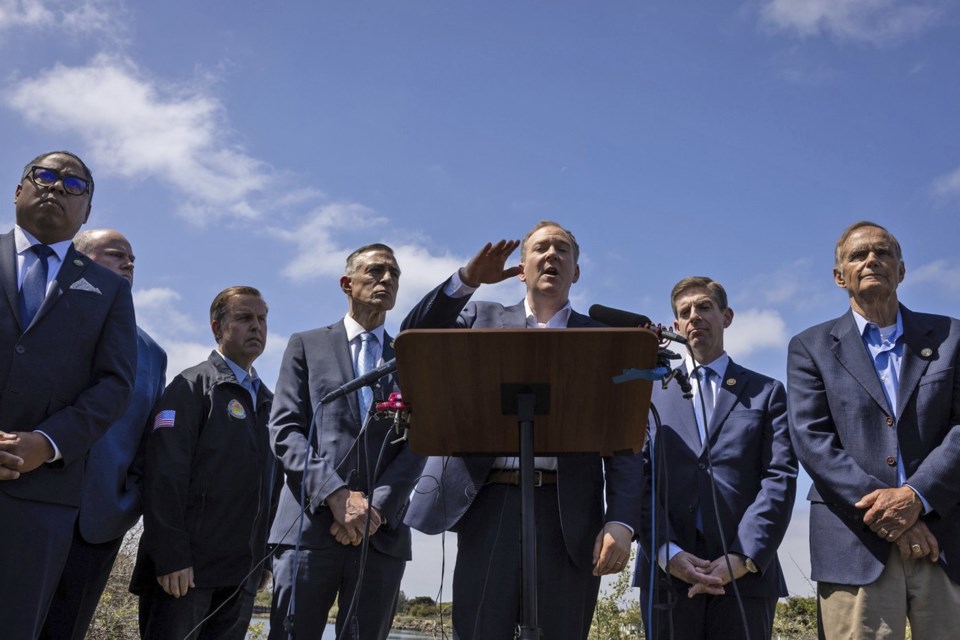SAN DIEGO (AP) — The United States and Mexico have signed an agreement outlining specific steps and a new timetable to clean up the longstanding problem of the Tijuana River pouring sewage across the border and polluting California beaches, officials from both countries announced Thursday.
Billions of gallons of sewage and toxic chemicals from Tijuana have polluted the Pacific Ocean off neighboring Southern California, closing beaches and sickening Navy SEALs who train in the water. That's despite multiple efforts and millions of dollars that have been poured into addressing the problem over decades, including under the first Trump administration.
“There is a great commitment by the two countries to strengthen cooperation,” Mexico’s Environmental Secretary Alicia Bárcena said Thursday after meeting with Environmental Protection Agency Administrator Lee Zeldin in Mexico City for the signing of the memorandum of understanding.
The accord comes three months after Zeldin flew to San Diego to meet with Mexican officials and visit the border.
“I smelled what a lot of residents in the community lived through and have to deal with," he said Thursday. "I saw the degradation of the Tijuana River valley. I heard about the beaches that were closed. I met with the Navy Seals, who have had their training impacted. It was a powerful visit all around for me.”
Under the agreement, Mexico will complete its allocation of $93 million toward infrastructure projects, including adhering to a specific schedule for priority projects spanning through 2027.
The 120-mile-long (195-kilometer) Tijuana River runs near the coast in Mexico and crosses into Southern California, where it flows through Navy-owned land and out to the Pacific.
As Tijuana’s wastewater treatment plants have aged, its population and industry -- including the manufacturing plants, known as maquiladoras that make U.S. goods — have boomed. At the same time, there has been an increase in the amount of toxins that have made their way into the river and into San Diego County — since 2018, more than 100 billion gallons of raw sewage laden with industrial chemicals and trash.
The pollution has sickened not only swimmers, surfers and lifeguards but also schoolchildren, Border Patrol agents and others who do not even go in the water. Scientists say the sewage is vaporized when it foams up and enters the air people breathe.
California beaches near the border have been closed more often than not over the past four years.
“The communities along the Tijuana River have suffered this public health crisis for far too long,” said Kristan Culbert, associate director of California river conservation at American Rivers, in a statement Thursday.
Since 2020, more than $653 million in funds have been allocated to address the issue, but the crisis has continued largely because of delays by the Mexican government, Zeldin has said.
Zeldin said this agreement factors in “population growth, operation and maintenance costs, and other variables that would make this solution durable and long term.”
He praised the new administration of Mexican President Claudia Sheinbaum, who took office last October, for its willingness to address the issue.
Sheinbaum said earlier Thursday that her government would expand a wastewater treatment plant that would reduce the contamination reaching the coast.
“There are other actions that were signed that we have to complete, that we’re going to get done in the next year for the entire Tijuana sanitation system, for the entire metropolitan Tijuana area," she said.
Sheinbaum said the United States also has to make investments in the binational problem.
Referring to another agreement to send more water to the U.S. to reduce Mexico’s water debt in the Rio Grande, Sheinbaum said the Tijuana River agreement “is a good example of how when our technical teams sit down, they can resolve a problem that seemed unsolvable.”
The U.S. has agreed to complete the expansion of the South Bay International Wastewater Treatment Plant next month. The agreement also stipulates that Mexico this year divert 10 million gallons per day of treated sewage away from the shore.
_____
Associated Press writer María Verza in Mexico City contributed to this report.
Julie Watson, The Associated Press



